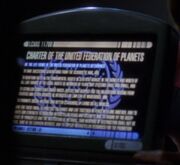Federation Law refers to the legal procedures and processes to civil and military citizens of the Federation. The law of the United Federation of Planets is based on several historic documents, such as:
- Magna Carta - Magna Carta is widely considered to be the first step in a long historical process leading to the rule of Federation constitutional law. (TOS: "Court Martial")

The Federation Charter, as seen aboard the USS Voyager
- Federation Charter - The Charter of the United Federation of Planets was the document that was ratified by the original members of the United Federation of Planets at that organization's founding in 2161. Jonathan Archer was one of the signers of the charter. (TNG: "The Outcast"; ENT: "Zero Hour", "These Are the Voyages...")
- Fundamental Declarations of the Martian Colonies - The Fundamental Declarations of the Martian colonies was an important legal document drafted on the planet Mars during or after the founding of the Martian colonies in 2103. (TOS: "Court Martial"; VOY: "The 37's")
- The Acts of Cumberland - The Acts of Cumberland were statutes pertaining to the rights of devices possessing artificial intelligence. (TNG: "The Measure Of A Man")
- United States Constitution - The United States Constitution is a base document for Constitution of the United Federation of Planets. (TOS: "Court Martial")
The rights afforded to civil citizens of the Federation include the following documents:
- Constitution of the United Federation of Planets - The Constitution of the United Federation of Planets outlining the framework by which the Federation is governed for the mutual benefit and protection of member planets and individual citizens. This document contains at least twelve "Guarantees" related to fundamental individual rights of citizens. The Seventh Guarantee is a fundamental right against self-incrimination protected by the Constitution of the United Federation of Planets. (TNG: "The Drumhead") Section seven gamma of the Twelfth Guarantee defines an artist as a "person who creates an original artistic work." (VOY: "Author, Author")
- Federation Code of Justice - Laws governing citizens of the United Federation of Planets. (DS9: "The Maquis, Part I", "The Maquis, Part II")
- Federation Judicial Code - The Federation Judicial Code is a set of guidelines and regulations related to legal issues in the United Federation of Planets. (VOY: "Tinker Tenor Doctor Spy")
The rights afforded to members of Starfleet include the following documents:
- Starfleet General Orders and Regulations - Starfleet General Orders and Regulations are a series of guidelines used to instruct members of Starfleet on the proper etiquette and policy in a situation that requires consultation for a resolution. These guidelines are especially useful in situations where flag officers cannot be consulted to resolve a situation. (VOY: "Equinox") The two most important General Orders are the Prime Directive and the Omega Directive. (VOY: "The Omega Directive")
- Uniform Code of Justice - The Federation Uniform Code of Justice is the legal basis of Starfleet court martial proceedings. (TNG: "The Drumhead")
Specific examples
Harcourt Mudd had been convicted under Federation law for smuggling, transporting stolen goods and purchasing a space vessel using counterfiet currency. (TOS: "Mudd's Women")
In 2268, Sarek said that Coridan could be protected by Federation law and its wealth administered for the benefit for its people. (TOS: "Journey to Babel")
Later that year, James T. Kirk ran into Harry Mudd again, he replied that due to all of Mudd's convictions under Federation law, he should have still been in jail rather than free. (TOS: "I, Mudd")
In 2269, Harry Mudd claimed to Captain James T. Kirk, who was trying to bring Mudd in for fraud, illegal drug manufacturing and swindling, that since he was on the planet Motherlode, which did not recognize Federation law, he was not subject to the resulting punishment. (TAS: "Mudd's Passion")
In 2366, Lieutenant Commander Data informed Kivas Fajo that by abducting him and placing him in his "collection", he had violated Federation law. (TNG: "The Most Toys")
In 2367, Wesley Crusher had studied the effects of outpost judiciary decisions on Federation law, which Jean-Luc Picard saw as an excellent opportunity for Crusher to accompany him to Pentarus V to settle a dispute with the miners of that world. (TNG: "Final Mission")
Bio-mimetic gel was a strictly controlled substance by the Federation and its sale was prohibited under Federation law. (DS9: "Distant Voices", "In the Pale Moonlight")
In 2371, Commander Benjamin Sisko informed Kai Winn Adami that bringing in Shakaar Edon with Starfleet force would violate Federation law, since he would be interfering in Bajoran internal affairs. (DS9: "Shakaar")
In 2372, Worf informed Quark that trafficking in illegal merchandise, such as a Tallonian crystal he planned to sell to Regana Tosh, was a felony under Federation law. (DS9: "Hippocratic Oath")
Later that year, Nog informed Quark that as a Starfleet cadet, he was required to report any violation of Federation law to his superiors. But, as he had not been sworn in then, he asked Quark for ten percent of the profits he planned to make smuggling kemocite. (DS9: "Little Green Men")
In 2375, Koval told Julian Bashir that Luther Sloan wanted revenge for the death of his mentor, Admiral Fujisaki, but he was faced with a dilemma, such as how he would seek vengeance against the Tal Shiar, whom Sloan believed was responsible for Fujisaki's death, without violating Federation law. (DS9: "Inter Arma Enim Silent Leges")
See also
- Diplomacy and law
- Judge Advocate General
External links
- The Law of the Federation: Images of Law, Lawyers, and the Legal System in "Star Trek: The Next Generation" at the Tarlton Law Library at the University of Texas at Austin
- School of Law - an excellent 1992 Law Review article on law in the 24th century as shown on Star Trek: The Next Generation
